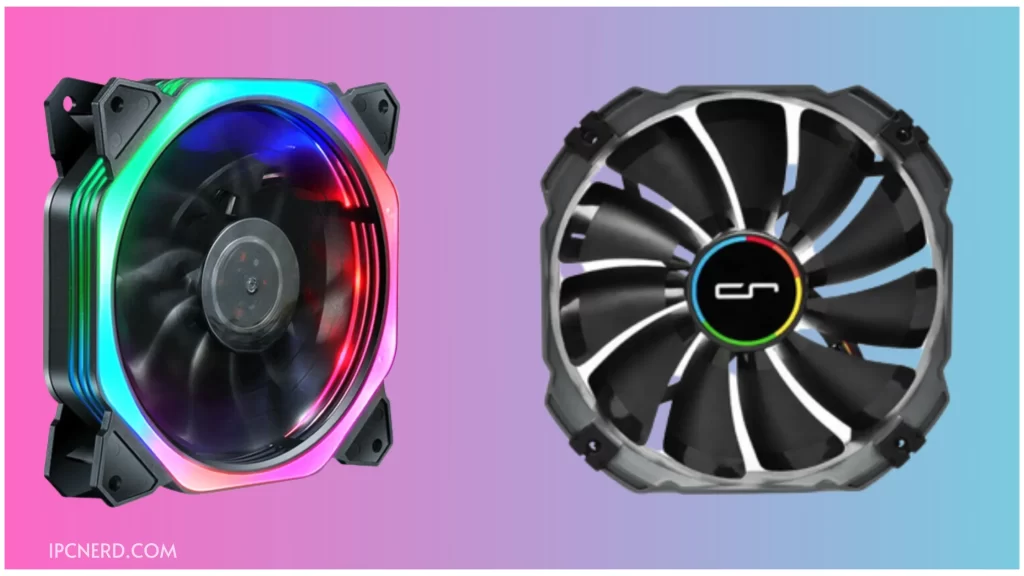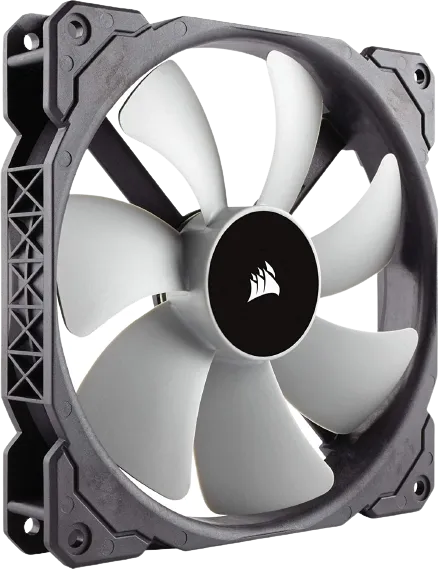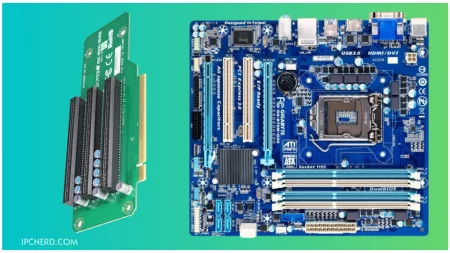One of the most important things about computer cases is airflow, and different sizes of fans can be used for this purpose.
You might have heard the terms “120mm†or “140mm,†but how do these measurements relate to the size of your case? How are they related to cooling performance? All of these questions and more will be answered in this article!
- What is the Difference Between 120mm and 140mm Case Fans?
- How do 120mm and 140mm Case Fans Work?
- What are the Advantages of a 120mm Case Fan?
- What are the Pros and Cons of a 120mm?
- What are the Advantages of a 140mm Case Fan?
- What are the Pros and Cons of a 140mm?
- Features of 120mm Vs140mm Case Fan
- Conclusion
What is the Difference Between 120mm and 140mm Case Fans?

Regarding case fans, there are two primary options: 120mm and 140mm.
The main difference between these two case fan sizes is that 120mm fans are typically used in cases with a smaller footprint, while 140mm fans are more common in larger cases or cases with extra ventilation.
In general, 120mm fans are better for systems with limited space and need fewer watts to operate. In comparison, 140mm fans offer greater airflow capacities and are better suited for high-performance systems. Choosing the right fan size for your PC is important based on its specific needs.
How do 120mm and 140mm Case Fans Work?
Regarding case fans, there are two types that most people are familiar with: 120mm and 140mm. These fans work differently, so knowing which is best for your PC is important.
A 120mm fan blows air out of the case, while a 140mm fan blows air in. The difference is that a 120mm fan creates more airflow across the entire surface area of the fan, while a 140mm fan focuses airflow towards the bottom of the case.
A 120mm fan will work just fine for computers with smaller cases. However, if you have a larger case or want more airflow, a 140mm fan will be better. Not only will it create more airflow, but it also works faster because it has less resistance.
So which should you buy? It depends on your computer and case setup. If you have a small case or don’t plan on upgrading anytime soon, go with a 120mm fan. If you have a larger case or plan on upgrading soon, get an a140mm fan.
What are the Advantages of a 120mm Case Fan?

A 120mm case fan is a popular choice for PC builders because it offers more airflow than a typical case fan, making it ideal for high-end cooling systems. Additionally, 120mm fans are typically less expensive than other fans and can be replaced more often.
One advantage to using a 120mm case fan over a standard-size fan is that the larger size allows the fan to move more air per stroke.
This means the fan will produce more airflow and dissipate heat faster than a smaller fan. In addition, larger fans can move more air when mounted in high-efficiency cases or front of radiators or intakes.
The downside to using a 120mm case fan is that they tend to be louder than other types of fans and may not be suitable for use in quiet environments. Additionally, because they move more air, 120mm fans can generate more noise than other sizes of fans when they are working.
What are the Pros and Cons of a 120mm?
The debate between 120mm and 140mm case fans has been going on for years. So, what are the pros and cons of a 120mm vs. a 140mm fan? Let’s take a look.
PRO:
The biggest pro of using a 120mm fan over a 140mm fan is that it will require less power. A 120mm fan will use about 30% less power than a 140mm fan, so your PC will be quieter and more efficient.
CON:
One con of using a 120mm fan over a 140mm fan is that it will require more room in your computer case. A 120mm fan will take up about three times as much space as a 140mm fan, so you’ll need to ensure your case can accommodate it.
What are the Advantages of a 140mm Case Fan?

A 140mm case fan is the standard size for cases in the PC world. They offer more airflow than a 120mm fan but less than a 200mm fan.
The main advantage of using a 140mm case fan is that it will provide more airflow than a 120mm or 200mm fan. This means that your computer will run cooler and quieter with one installed.
Additionally, because they offer less airflow than larger fans, they are not as likely to cause a build-up of dust and debris on the internal parts of your computer.
Lastly, 140mm case fans are less expensive than larger fans and are often available in various colors and designs to match your computer’s exterior.
What are the Pros and Cons of a 140mm?
Choosing a 140mm case fan over a 120mm case fan has many pros and cons. Let’s look at some of the benefits and drawbacks of each type of fan.
The Pros of a 140mm Case Fan:
- They are typically 13% more powerful than a 120mm case fan.
- They produce more airflow than a 120mm case fan, which can be important if your computer runs hot.
- They are less likely to create unwanted noise than a 120mm case fan.
- Some 140mm fans have LED lights that can be turned on or off, which can be helpful in dark environments or when you want to save energy by reducing the number of fans running at once.
- Some 140mm fans have special features, such as thermal probes or dust filters, that make them better suited for specific tasks or uses than other fans.
- They are usually less expensive than fans with similar specs, making them affordable compared to high-performance options like 240 mm case fans or top-of-the-line 280 mm case fans.
- Some 140mm fans have mounting brackets that make installation easier than other fans, especially if your computer has limited space inside the casing.
- Many manufacturers offer specific versions of their cases designed for use with140 mm case fans, making it easier to find a fan that meets your specific needs.
The Cons of a 140mm Case Fan:
- They typically produce less airflow than fans with a larger diameter, which can be a problem if your computer is running hot and you want to increase the airflow.
- They are more likely to create unwanted noise than fans with a smaller diameter, which can be annoying if you are trying to work in a quiet environment.
- They can be harder to fit into tight spaces inside your computer casing, which might sometimes limit their use.
- Some 140mm fans have a limited lifespan, often lasting around 6-8 years before they need to be replaced.
- They can be more expensive than other case fans, especially if you are looking for high-performance options that offer longer lifespans or special features.
Features of 120mm Vs140mm Case Fan
Fans come in different sizes and shapes, but what do they do? In this blog post, we will compare the features of 120mm case fans and see which is better for your PC.
First, let’s look at the size differences between these two types of fans. A 120mm case fan will typically be smaller than a 140mm fan, and both will be smaller than a 160mm fan.
This means that they will move more air per unit of space, which is great for lower-power PCs or laptops that need extra cooling.
Now let’s take a look at the features each type of fan has to offer. A 120mm case fan typically has low, medium, and high speeds. This allows you to customize the airflow according to your needs.
Some fans can also switch between static pressure and airflow modes, which can provide even more flexibility when cooling your computer.
Meanwhile, a 140mm case fan usually only has low and high speeds. This might be fine for most users, but some prefer more control over their airflow. If you want four speeds or more on your fan controller, you’ll need to use a 160mm fan instead.
Lastly, LED lighting is one common feature on both 120mm and 140mm fans. This allows you to see how well your system is cooled without removing the cover or opening the case. Some fans have multiple colors available, which can help you identify which fan is working properly.
So which fan should you buy? While there are certainly benefits to both 120mm and 140mm fans, ultimately, it comes down to your specific needs.
If you’re looking for a small, low-power fan that will move a lot of air, a 120mm model is likely the best choice. If you want more control over your airflow and prefer fewer speeds, go with a 140mm fan instead.
Conclusion
Regarding case fans, most people favor the shorter 120mm models over the longer 140mm ones. But is that always the best decision? In this article, we have compared and contrasted the two types of case fans so that you can make an informed choice about which one is right for your system.
Ultimately, it depends on a few factors, including the type of system you have and what kind of noise level you are willing to tolerate. Read on to find out more!







